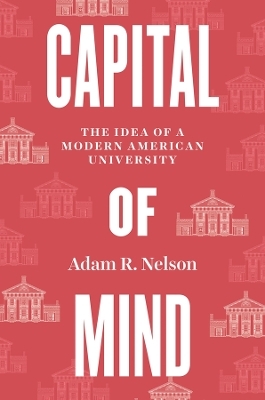
Capital of Mind
University of Chicago Press (Verlag)
978-0-226-82920-3 (ISBN)
Capital of Mind is the second volume in a breathtakingly ambitious new economic history of American higher education. Picking up from the first volume, Exchange of Ideas, Adam R. Nelson looks at the early decades of the nineteenth century, explaining how the idea of the modern university arose from a set of institutional and ideological reforms designed to foster the mass production and mass consumption of knowledge. This “industrialization of ideas” mirrored the industrialization of the American economy and catered to the demands of a new industrial middle class for practical and professional education. From Harvard in the north to the University of Virginia in the south, new experiments with the idea of a university elicited intense debate about the role of scholarship in national development and international competition, and whether higher education should be supported by public funds, especially in periods of fiscal austerity. The history of capitalism and the history of the university, Nelson reveals, are intimately intertwined—which raises a host of important questions that remain salient today. How do we understand knowledge and education as commercial goods? Should they be public or private? Who should pay for them? And, fundamentally, what is the optimal system of higher education for a capitalist democracy?
Adam R. Nelson is Vilas Distinguished Achievement Professor of Educational Policy Studies and History at the University of Wisconsin–Madison. He is author of The Elusive Ideal: Equal Educational Opportunity and the Federal Role in Boston’s Public Schools, 1950–1985 (also published by the University of Chicago Press), among other books.
Preface
Introduction
Part I: The Idea of a “University,” 1812–18
Charlottesville
1. A Plan of a University in Virginia
2. The Literary Fund
Cambridge (via Göttingen)
3. Our Young Geniuses in Boston
4. The State of Literature in Germany
Consolidation
5. Every Science Deemed Useful
6. No One Will Buy What No One Has Offered to Sell
Part II: The Economy of Knowledge, 1818–24
Crises
7. The Late Riot at Göttingen
8. The Inadequacy of the Funds for the University
Controversies . . . and Curricula
9. A Professor of Political Economy
10. The Science of Wealth
Competition!
11. If We Can Ever Have a University at Cambridge
12. Intellectual Economy
Part III: The Industrialization of Ideas, 1824–30
Cosmopolitanism/Commercialism
13. To Improve Our Science, as We Have Done Our Manufactures, by Borrowed Skill
14. Filled by Foreigners
Conflict
15. Modern Views of Liberal Education
16. Friedrich List
Catalyst
17. Intellectual Power
18. An Honorable Competition with the Universities of Europe
Conclusion
Afterword
Acknowledgments
Notes
Bibliographic Essay
Index
| Erscheinungsdatum | 21.12.2023 |
|---|---|
| Sprache | englisch |
| Maße | 152 x 229 mm |
| Gewicht | 794 g |
| Themenwelt | Geisteswissenschaften ► Geschichte ► Regional- / Ländergeschichte |
| Sozialwissenschaften ► Pädagogik ► Allgemeines / Lexika | |
| Sozialwissenschaften ► Pädagogik ► Bildungstheorie | |
| ISBN-10 | 0-226-82920-0 / 0226829200 |
| ISBN-13 | 978-0-226-82920-3 / 9780226829203 |
| Zustand | Neuware |
| Informationen gemäß Produktsicherheitsverordnung (GPSR) | |
| Haben Sie eine Frage zum Produkt? |
aus dem Bereich


